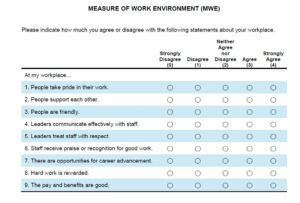The mission of the Institute for Child and Family Well-Being is to improve the lives of children and families with complex challenges by implementing effective programs, conducting cutting-edge research, engaging communities, and promoting systems change.
The Institute for Child and Family Well-Being is a collaboration between Children’s Wisconsin and the Helen Bader School of Social Welfare at the University of Wisconsin-Milwaukee. The shared values and strengths of this academic-community partnership are reflected in the Institute’s three core service areas: Program Design and Implementation, Research and Evaluation, and Community Engagement and Systems Change.
In This Issue
- Meet the ICFW Affiliates – Leah Jepson & Jennifer Winkler
- Program Design and Implementation
- Research and Evaluation
- Recent and Upcoming Events
Meet the ICFW Affiliates
As Community Engagement and Systems Change are a core pillar of the ICFW, collaboration with our community and systems partners is critical to fulfilling our mission. In recognition of those that value collaboration and whose mission seeks to improve child and family well-being, we have invited those partners to join us as ICFW Affiliates. We are honored to introduce our three newest ICFW Affiliates with whom we look forward to partnering with now and into the future.
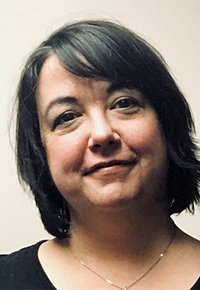
Leah Jepson is the Project Director of the Milwaukee Coalition for Children’s Mental Health (CCMH) at Mental Health America of Wisconsin, an initiative to improve the mental health of children 0 – 8 in the City of Milwaukee through systems change and authentic engagement of people with lived experience. She is also the co-founder and Executive Co-Director at the Next Step Clinic, a community-based collaboration to address disparities in Autism Spectrum Disorder and children’s mental health identification and treatment. Leah has nearly 25 years’ experience as a social worker that includes home visitation, research, community-based program development and implementation, advocacy, and coalition-building. Her current focus is on young children’s mental health and social-emotional development, authentic engagement of those with lived experience, social justice and health equity.
Leah holds a Master’s of Science degree in Social Work and a Bachelor of Arts degree in Psychology, both from the University of Wisconsin-Milwaukee.
Leah has collaborated with ICFW through the Milwaukee Coalition for Children’s Mental Health to align action and values around children’s mental health, bringing in ICFW staff to provide presentations for coalition members. Leah served on an expert panel for the ICFW webinar, Authentic Community Engagement: Made in Milwaukee. Most recently, we collaborated with ICFW through the Next Step Clinic. When the clinic was first opening, Dr. Topitzes joined the team to advise clinic leadership on the manifestations of childhood trauma in the children that are served by the clinic. The ICFW team has also trained Next Step Clinic clinicians in Parent-Child Interaction Therapy through the Trauma and Recovery Project.
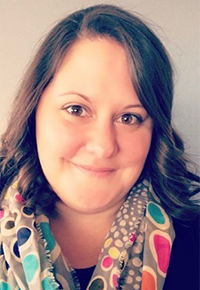
Jennifer Winkler is currently the Family Case Management Well-Being & Family Support Manager at Children’s Wisconsin, where she has worked for the last 12 years in various direct practice and leadership positions within the agency. Throughout her career, Jennifer has demonstrated passion around staff and program development, continuous quality improvement efforts, and building an organizational culture that is rich in innovation.
Jennifer received a Bachelor of Arts degree from Carthage College in 2006, with a major in Social Work, and a Master’s of Social Work from the University of Wisconsin-Madison in 2007, with a specialization in child and family welfare.
The ICFW team has worked collaboratively with Jen to conduct a human-centered design process that led to the adaptation and implementation of Mobility Mentoring® (MM) into Milwaukee’s Family Support Program. Jen has continued to collaborate with the ICFW to engage and interview her staff and the families that they serve to evaluate the effectiveness of and opportunities to improve MM. Additionally, Jen has co-presented with ICFW at regional and national conferences, and advocated for MM and strategic adaptation which has inspired other Children’s programs to begin implementation of the model.
Program Design & Implementation
The Institute develops, implements and disseminates validated prevention and intervention strategies that are accessible in real-world settings.
Minecraft® to Build Our Children’s Social Skills
A virtual game-based, social skills group recently completed its first prototype iteration. The group planned to improve social and emotional skills such as social communication, cooperation, problem solving, and self-control. For 6 weeks, children ranging from 6.5 to 13 years old gathered on Zoom with a Mental Health Consultant for a brief didactic lesson on a specific social skill, and then the group played the video game Minecraft® to practice and develop the skill.
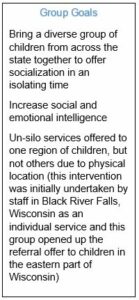
There was initially a group of 9, with 8 finishing the group. A few participants missed 2 groups meetings in the middle weeks. Although technical problems were frustrating to the facilitator and the participants in the beginning, the participants did not note this as a barrier on a post-group survey. Weekly email touch points with caregivers were provided by the facilitator and the use of the Manatee app was expected, however, low enrollment in the app and lack of engagement with this app by parents and staff found this not to be a useful tool in tracking progress. Of those who responded to a feedback request, all (children and parents alike) agreed the group was a useful way to spend their time and felt the group helped them improve their social skills. One child respondent and the facilitator shared they hope the group can run longer each week in the future. In fact, as the weeks went by, the children often preferred to continue interacting with each other in the game world after group time had ended. Some lessons learned garnered through the use of an After Action Review completed by staff suggested that a mixed level of familiarity with Minecraft® actually facilitated more opportunities to practice adaptive social skills and strongly indicated the need for a facilitator workflow to be documented so another facilitator could recreate or step in, if necessary. Also suggested by staff was splitting the age groups up, although the children respondents did not mention this.
In future iterations, ICFW will continue to work on supply chain issues brought on by COVID-19 to make a standardized pre and post assessment a part of the intake and discharge process in order to gather data on efficacy, likely implement a 90 minute group instead of 60 minutes, have a written workflow for the facilitator, and expand the referral opportunity to all children in the state.
For more context, see the original briefing in the Spring 2021 newsletter. If you are interested in referring a child to a future group, please email mchristian@chw.org.
Learn More:
ICFW Practice Brief – After Action Review
ICFW Practice Brief – Strategic Learning
Raelene Dundon
Utilizing Technology for Continued Evidence-Based Clinical Training
By Kate C. Bennett, LCSW
With support from the Trauma & Recovery Project, a 5-year SAMHSA-funded initiative that aims to increase the availability and accessibility of trauma-responsive treatments in southeastern Wisconsin, the ICFW has continued to collaborating with partner agencies to disseminate Parent-Child Interaction Therapy (PCIT) to families Milwaukee, Racine, and surrounding southeastern Wisconsin counties.
This summer, PCIT International certified trainers from Children’s Wisconsin/ICFW and Washington County Health and Human Services facilitated the second annual virtual Wisconsin Regional PCIT Initial Therapist Training for 9 newly trained clinicians. Each clinician participated in 40 total hours of didactic evidence-based workshops over Zoom videoconferencing during learning sessions held in May and July 2021. All trained clinicians will be providing the evidence-based intervention to families under consultation with our trainers through May 2022.
Please help us in welcoming each clinician to our Wisconsin Regional PCIT community!
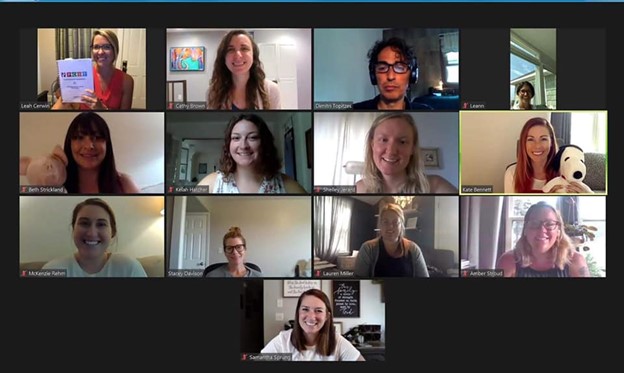
Beth Strickland, LCSW – PSG (Washington County)
Stacey Davison, LCSW – PSG (Washington County)
Amber Stroud, LPC – Pediatric Psychology Associates (Milwaukee County)
Cathy Brown, LPC – Children’s Wisconsin (Milwaukee County)
Lauren Miller, LPC – Children’s Wisconsin (Milwaukee County)
Leann Vice-Reshel, PsyD, LPC – Children’s Wisconsin (Milwaukee County)
McKenzie Rehm, LPC – Children’s Wisconsin (Milwaukee County)
Michelle Jerard, LPC – Children’s Wisconsin (Milwaukee County)
Kelah Hatcher, MSW Student – University of Wisconsin Milwaukee / Children’s Wisconsin (Milwaukee County)
Learn More
Children’s Wisconsin Telehealth: Video Visits
PCIT at ICFW
Research and Evaluation
The Institute accelerates the process of translating knowledge into direct practices, programs and policies that promote health and well-being, and provides analytic, data management and grant-writing support.
A Brief Measure of Work Environment for Human Service Organizations
The Measure of Work Environment (MWE) is a new, brief instrument developed to assess work environment in human service agencies. The MWE demonstrated good internal consistency when tested with staff from child welfare and home visiting agencies. With an administration time of less than five minutes, the MWE offers applied researchers and evaluators an efficient method to assess and compare organizational functioning. It may also provide program administrators insight into specific areas of improvement.
Learn More:
Publication – Human Service Organizations: Management, Leadership & Governance.
Tool – Measure of Work Environment
Recent and Upcoming Events
The Institute provides training, consultation and technical assistance to help human service agencies implement and replicate best practices. If you are interested in training or technical assistance, please complete our speaker request form.
Presentations, Trainings and Workshops:
May and July 2021:
August 2021:
PCIT National Biennial Convention
- ICFW will be presenting 5 panels, symposia, papers and posters


